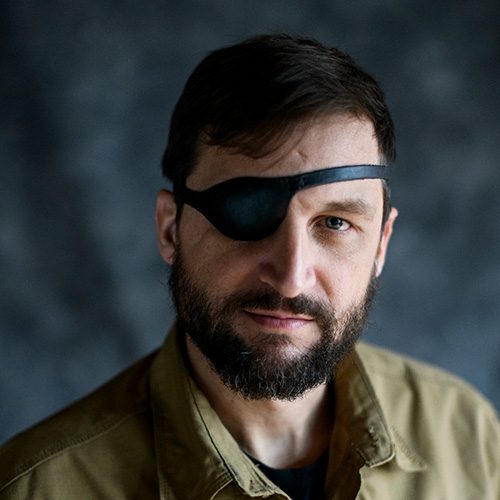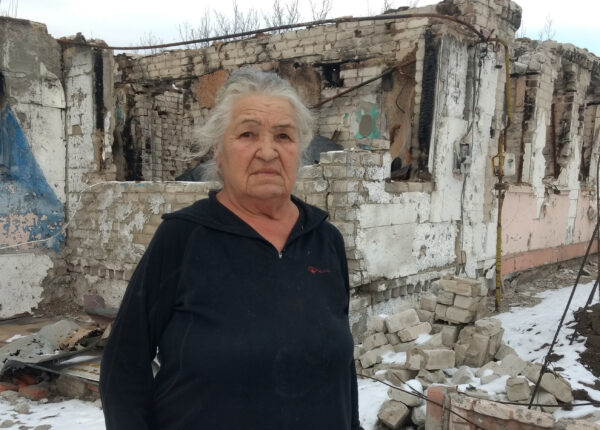
Lawrence Wilkerson, right, former Chief of Staff to Secretary of State Colin Powell, played an integral role in launching the Iraq War in 2003 — and has said that the decision engage in that war was a mistake. In a conversation with Postindustrial, he expressed dire warnings about a possible conflict with Iran. “The moment you put an American troop in Iran, 80 million Iranians will forget their problems with their government and become a solid entity,” he said. “That’s not something you want to wade into.” Photo by CQ Roll Call via AP Images.
Bush adviser says war with Iran ‘would be Iraq times 10’
Former chief of staff to Secretary of State Colin Powell tells Postindustrial of dire consequences, likely need to reinstate draft for soldiers in event of an Iranian war
~By CARMEN GENTILE AND NICK GRIMES
The spectre of war with Iran seemingly looms larger each day, an ominous shadow that extends all the way from the Middle East to the heart of Postindustrial America.
Earlier this week Iran shot down an American drone in or near Iranian airspace depending on whose account of the incident you believe — a provocation that lead to the Trump Administration to order and then recall a military assault on Iran. These latest turns have Iran experts and armchair analysts pontificating on the prospect of yet another, potentially ill-fated incursion into that part of the world
Amid these increasing tensions between Washington and Tehran, Postindustrial recently sat down with Lawrence Wilkerson, a retired Army colonel who was also chief of staff to Secretary of State Colin Powell from 2002 to 2005.
Wilkerson spoke candidly about the possibility of Washington invading Iran and the pitfalls of waging another war in that region. His words are particularly resonant considering his role in the build up to war with Iraq, and his subsequent mea culpas and dire warnings, published in a New York Times column he wrote last February, about what a war with Iran would look like.
In that column, the former Powell confidante wrote that, as the chief of staff for the former secretary of state, he “helped Secretary Powell paint a clear picture that war was the only choice” in the secretary’s 2003 address to the United Nations.
It was in that address that Powell invoked suspicious and ultimately faulty intelligence about then Iraqi President Saddam Hussein’s ties to al Qaeda and weapons of mass destruction that never existed.
Wilkerson sees similarities among some in the Trump administration, most notably National Security Adviser John Bolton itching to find reasons to take down Tehran, a move that would instantly turn that entire nation against us.
“We are talking about (Iranian) people who were bloodied in eight years of brutal war with Iraq … who have now learned a whole hell of a lot more about war by fighting ISIS in Syria and Iraq and are probably willing to die to the last Iranian to preserve their country,” Wilkerson during a lengthy conversation with Postindustrial.
“We are talking about (Iranian) people who were bloodied in eight years of brutal war with Iraq and are probably willing to die to preserve their country”
He noted that invasion of Iran would most likely galvanize the republic’s entire population into putting aside their grievances with the Iranian government in favor or focusing all of their ire on the invading U.S. forces.
“The moment you put an American troop in Iran, 80 million Iranians will forget their problems with their government and become a solid entity,” he said. “That’s not something you want to wade into.”
Despite sharing a border with Iraq, whose population in 2003 numbered about 25 million, war with a much larger Iran would require exponentially greater U.S. troop levels and financial commitment significantly larger than the Iraq campaign.
At the height of the Iraq war, U.S. forces had in excess of 150,000 troops on the ground.
“Well, I think what would happen would be Iraq times 10,” he said.
Wilkerson speculated that in order to subdue such a large population that is motivated and much better trained and equipped than the al Qaeda and ISIS fighters in Iraq would require one million service men and women – necessitating the reinstitution of the draft – at least a decade of fighting, and $2.5 trillion.
“You also need allies to go in with you,” he said, a prospect unlikely to happen. “Basically everybody (already) said ‘no.’”
Meanwhile Shia fighters from other parts of the region — Hezbollah, Shia militias in Iraq and others – would surely answer the call to the fight.
Not only would the United States likely go it alone in a war with Iran, but Postindustrial America would be disproportionately burdened with supplying the young men and women need to wage war in Iran.
Hundreds of thousands from this region have already served in Afghanistan and Iraq wars. Pennsylvania alone has the fourth-largest veteran population in the country at just under a million, only behind California, Texas, and Florida. Ohio is sixth, with some 860,000 veterans.
Sending countless more servicemembers to Iran to fight an unnecessary and ill-conceived war is not only ill advised but should be considered a nonstarter to all Americans no matter where they live, Wilkerson said.
Postindustrial founder Carmen Gentile has worked for some of the world’s leading publications and news outlets including The New York Times, USA Today, CBS News and others. His book, “Blindsided by the Taliban,” documents his life as a war reporter and the aftermath of his brush with death after being shot with a rocket-propelled grenade in Afghanistan. Reach him at carmen@postindustrial.com.

Nick Grimes is a combat veteran of the war in Afghanistan and director of programs and operations for the Veterans Breakfast Club. He is also the host of the upcoming podcast series “Truth About War.”
Related Stories
In eastern Ukraine, the war between present and past
By Martin Kuz | Story and photographs
Expecting more than $1 billion in opioid settlement money, Pa. grapples with policing versus treatment
By Ed Mahon of Spotlight PA and Kate Giammarise of WESA
A Burmese photographer fled his country and left everything behind — now he needs your help
By Staff | Photographs by Hong Sar





